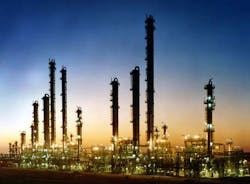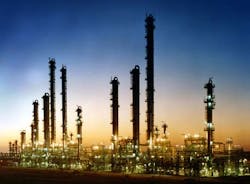Knowing how vital energy is to both economic health and security of our nation – much less the trucking industry – I for one certainly couldn’t wait to trumpet such good news.
Yet maybe it’s a little too good to be true – and some of the more sober-eyed realists on this topic are none other than members of the U.S. oil and gas industry.
According to a new survey conducted by the Deloitte Center for Energy Solutions – a division of global consulting firm Deloitte LLP – while America can bank on plentiful domestic natural gas, the nation should expect a continued reliance on foreign oil for the next decade at least.
Three-quarters of the respondents to Deloitte’s poll think the U.S. is already natural gas self-sufficient, or will be within 10 years. Yet when it comes to oil, however, those respondents are far less optimistic about the country’s ability to meet demand with domestic supplies, with 54% saying the U.S. will never be completely oil self-sufficient and a mere 26% saying oil self-sufficiency is achievable in the next 10 years.Yet Peter Robertson (at left) for one – an independent senior advisor to Deloitte and former vice chairman of Chevron Corp. – believes that if the question of oil self-sufficiency had been expanded to include all of North America, and not just the U.S., then a different view might emerge from the oil and gas industry.
"Given North America's remarkable success with unconventional oil – both tight oil in places like North Dakota and oil sands in Canada – something closely resembling self-sufficiency is arguably within reach," he explained. "When you combine unconventional oil supplies with the recently established increase in shale gas reserves, you could have the makings of a true energy renaissance."
Now, Deloitte conducted this survey in late October – well before the IEA’s report went public – and canvassed 250 oil and gas professionals from that the firm dubs a “decision-making” demographic: Respondents were 48 years old on average, had an average of 20 years of experience in the industry, had college or graduate degrees, and earned over $100,000 per year.
Another key point unearthed by Deloitte’s poll: Natural gas prices are expected to keep falling, while oil prices are expected to do just the opposite.
Looking at 2013, oil and gas professionals see natural gas prices remaining quite low – with 40% predicting prices less than $3 per MMBtu (which stands for one million British Thermal Units) and a large majority (86%) predicting Henry Hub prices under $4 per MMBtu. More specifically:
- 4% see prices below $2 per MMBtu.
- 36% see prices between $2 and $2.99 per MMBtu.
- 46% see prices between $3 and $3.99 per MMBtu.
- 14% see prices above $4 per MMBtu.
Crude oil prices, on the other hand, are expected to remain relatively strong next year, according to the majority of oil and gas professionals responding to Deloitte’s surveys, with 57% thinking the average cost of a barrel of West Texas Intermediate (WTI) – the North American price measuring stick for oil, if you will – will range between $80 and $99 a barrel next year. Indeed:
- 2% see prices below $80 per barrel.
- 17% see prices at $80 to $89 per barrel.
- 40% see prices at $90 to$99 per barrel.
- 28% see prices at $100 to $109 per barrel.
- 7% see prices at $110 to $119 per barrel.
- 5% see prices above $120 per barrel.
By contrast, liquefied natural gas (LNG), which is often touted for long-haul trucks, is being by the industry experts in the survey as more suited as an export commodity than a transportation fuel, he said.
Ihne noted that when asked to identify the best alternative transportation fuels to gasoline and diesel, survey respondents clearly preferred natural gas – with 67% seeing products like CNG as the most promising option to refined oil products, far ahead of other top choices like electricity (11%) and biofuels (8%).
Most survey respondents also think that the abundance of shale gas will lead to LNG exports, with a large majority (72%) expect that LNG export terminals will eventually receive government approval – with 36% believing this approval will occur before 2014 and the exact same percent expecting approval after 2014.
Similarly, the survey found that even with exports of LNG, most oil and gas decision-makers don't see a meaningful increase in domestic natural gas prices. A strong majority (93%) sees either no price increase or a slight change in price. In contrast, less than 1 in 10 (7%) see a significant price increase.
"It's not surprising that oil and gas decision-makers are enthusiastic about the role of natural gas in our national energy future, given burgeoning supplies, America's comparatively low cost of extraction, and its relative cleanliness," added John England, vice chairman, Deloitte LLP, and leader of Deloitte's oil and gas practice. "What is surprising is that natural gas is a fuel source that we were aggressively preparing to import at high world prices just a few years ago."
That at least, thankfully, the U.S. won’t have to do. Hopefully, where oil is concerned, we’ll continue to see imports drop in the near future – whether due to wider use of natural gas, more domestic production of the black stuff… or both simultaneously. Either way, let’s hope our nation continues on down this path of energy self-sufficiency.



